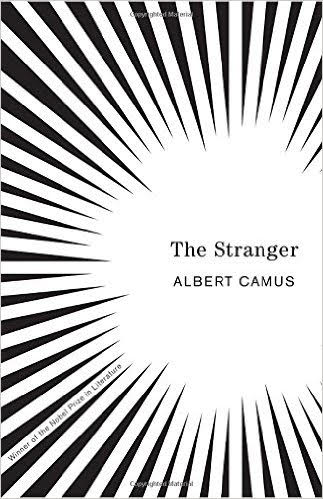"The Stranger" by Albert Camus

Above: "The Stranger." Albert Camus - 123 pages.
"I only meant that the hero of my book is condemned because he does not play the game."
I completed reading this book today.
I first read this novel during my high school years (AP English, Mrs. Nelson, Provo High School, 1963). I saw a paperback copy of the book on a discount table at the Sugar House (SLC) Barnes and Noble the other day and decided it was time for a reread. Besides, the book was discounted on one of those "three for the price of two" promotional deals.... book buying sucker that I am.
"The Stranger," first published in 1946, translated here to English from the French, is the story of an ordinary man who unwittingly gets drawn into a senseless murder on a sundrenched Algerian beach. Camus explored what he termed "the nakedness of man faced with the absurd."
Meursault, a French citizen in post-war Algeria, is an average guy with an average job. He attends his mother's funeral where he's noticed to be somewhat insouciant about his mother's death. He does not weep. Offered the chance to have his mother's casket opened so he can see her one last time, Meursault demures. Mersault didn't dislike his mother, he just didn't see the point in going through the societal rituals that normally accompany a loved one's passing.
Meursault shows a similar disinterestedness towards his girl friend. She wanys to marry Mersault, but Meursault callously notes that if some other nice looking girl made the same offer he'd be equally inclined to marry her. The concept of love and commitment seems to have no meaning to Meursault. "Carpe diem/seize the day" seems to be Meursault's guiding philosophy... if he has one at all. "Now" has some importance... but "yesterday" and "tomorrow" seem to have little relevance as Meursault sees the world.
Several day's after his mother's funeral, Meursault kills an Arab man who was involved in a conflict with a friend. The circumstances of the murder are ambiguous, and there seems to be plenty of space for "reasonable doubt" as to Meursalt's innocence. Still, Meursault is tried and sentenced to death. Its his seeming lack of willingness to engage with the polite rules of society that does him with the jury.
In January 1955, Camus wrote:
"I summarized "The Stranger" a long time ago, with a remark I admit was highly paradoxical: 'In our society any man who does not weep at his mother's funeral runs the risk of being sentenced to death.' I only meant that the hero of my book is condemned because he does not play the game."
Meursault is a truthful person. He speaks his mind without regard for others. He is regarded as a stranger to society due to this indifference.
"The Stranger" is one of the most widely read novels of the 20th century. Camus was awarded the Nobel Prize for Literature for the book in 1957.
Interestingly (to me anyway), I met a number of "pied noirs" (repatriated French post French occupancy of Algeria) while serving as an LDS missionary, mainly in the Paris region, during 1965 to 1967.
Though I was not instrumental in effecting any "pied noirs" conversions to Mormonism, the "pieds noirs," I knew, disproportionate to the French population as a whole, seemed pleased to hear the LDS story from the mouths of 19/20 year old naifs from Utah. I remember one "pied noir" family vividly: 'la famille Gasc." Elder Sabey (from Montreal) and I were invited to their Maisons Alfort (Paris banlieu southeast) home for dinner at least a dozen times. There, in addition to LDS lore, we would talk about things of the world... like the "futility of the Vietnam War" I remember these meetings, speaking in French, as stimulating, enjoyable, and culturally eye opening.
The Gasc family was practicing Catholic. Notwithstanding their disruptive, post war removal from Algeria, they believed in order, society and progress. They had a faith in the future (where most French were losing faith in traditional religion). Its easy to understand how Meursault's insouciance about his mother, his girlfriend, and his "crime" would have upset the mainstream of polite French society in mid century Algiers, had "la famille Gasc" been representative of "pieds noirs" generally.
"The Stranger" is linked to the philosophy of existentialism which implies that life is, at the end of the day, an absurdity sans any intrinsic meaning.
Traditionally, it is religion that has given meaning to life. It remains to be seen in our increasingly secularized world, if a substitute aspirational culture takes shape, or if the Meursaults of the world become the norm.
If you are going to read one hundred books about western culture before you die, "The Stranger" should probably be one of them.